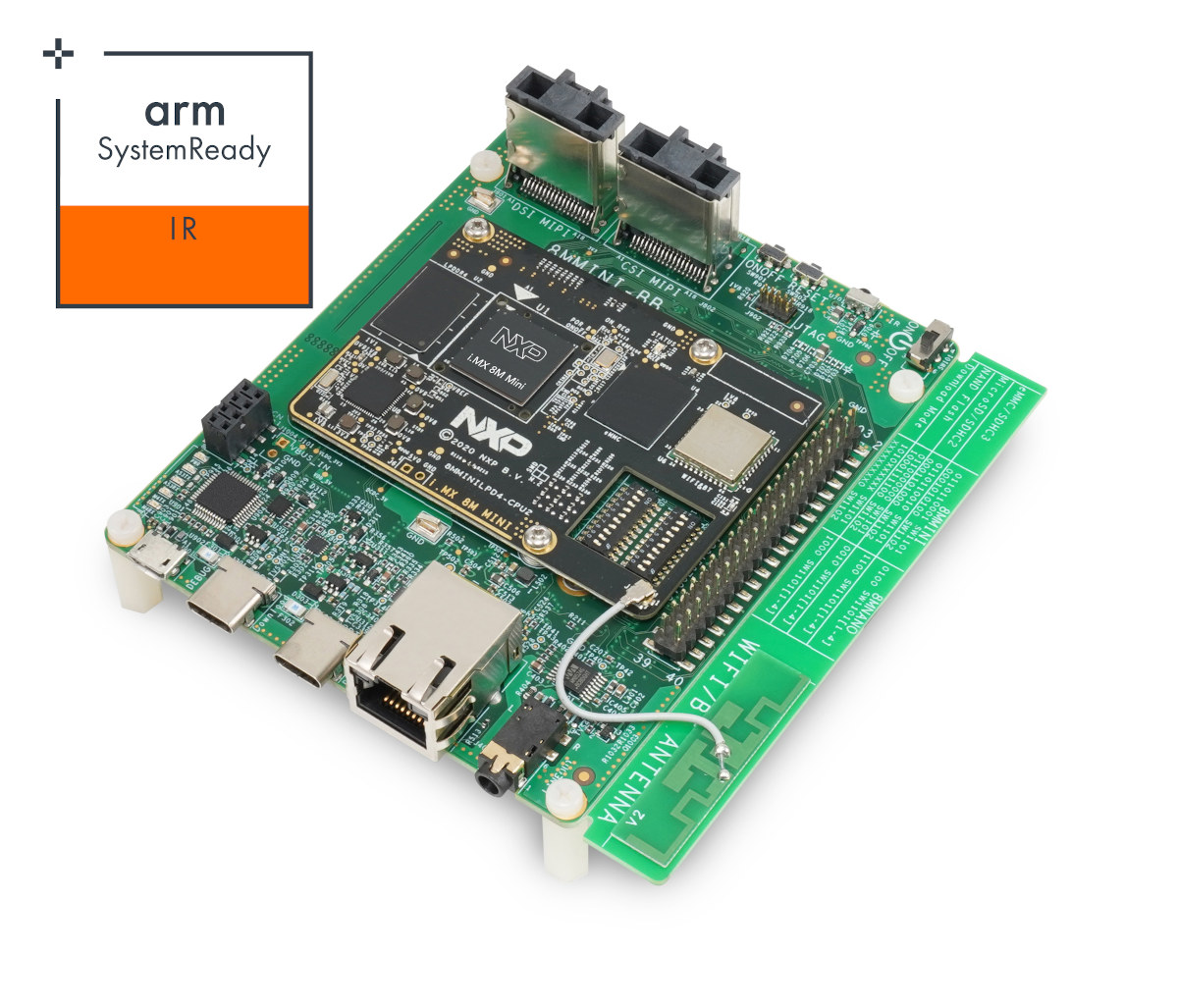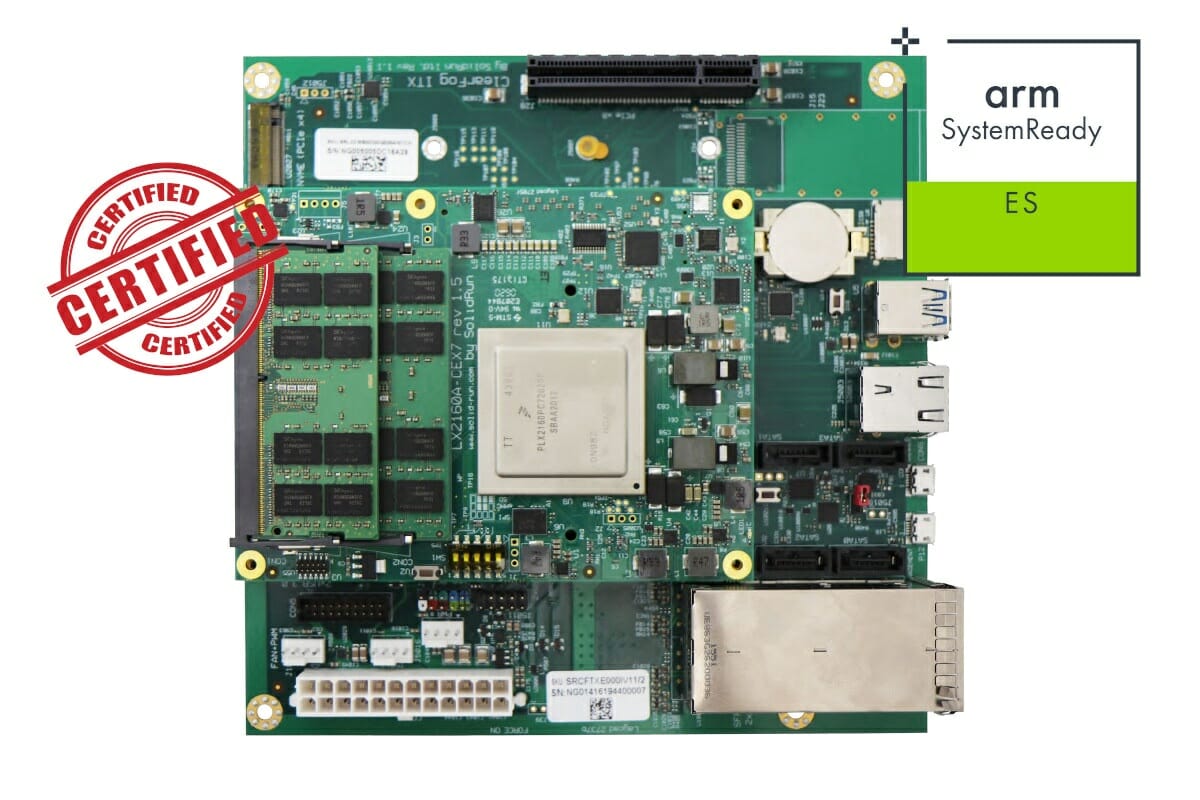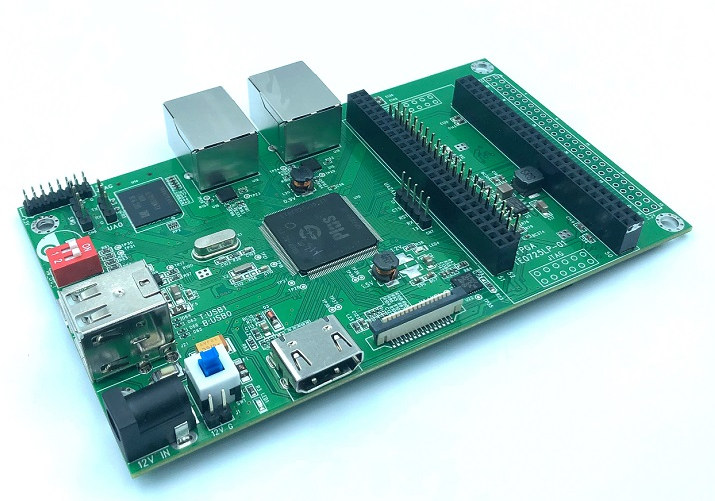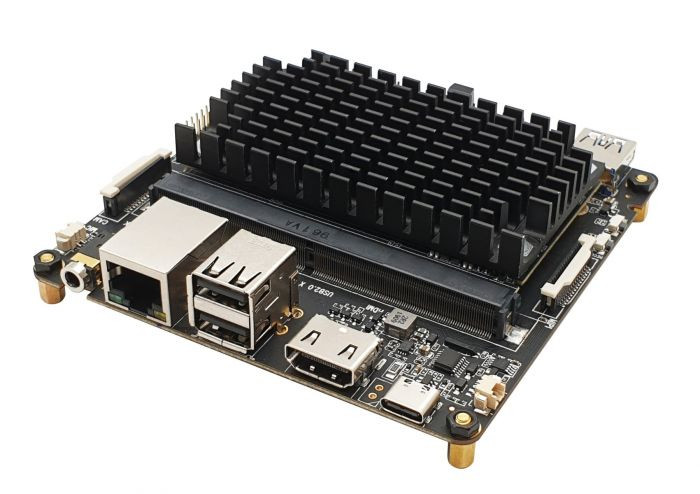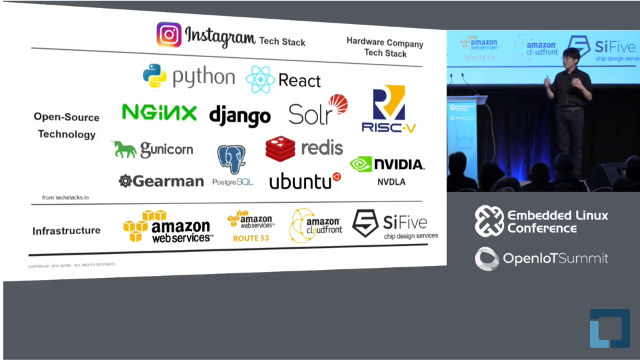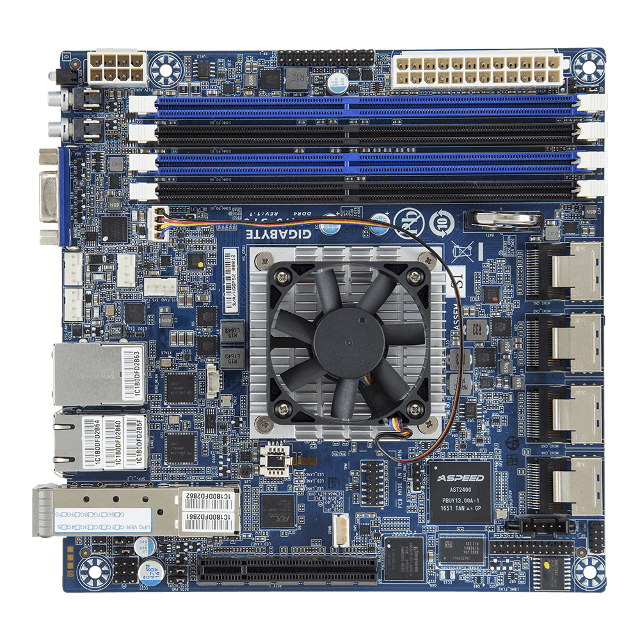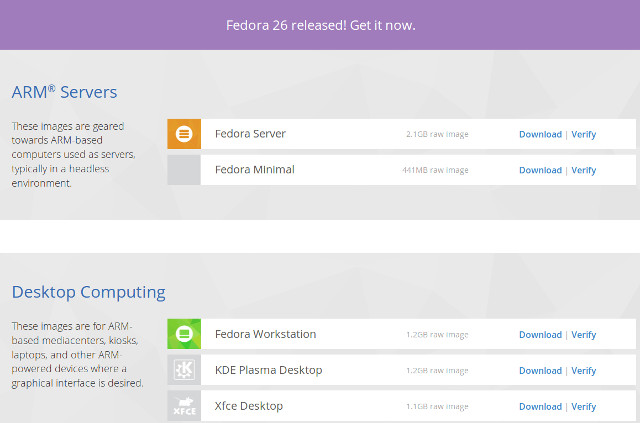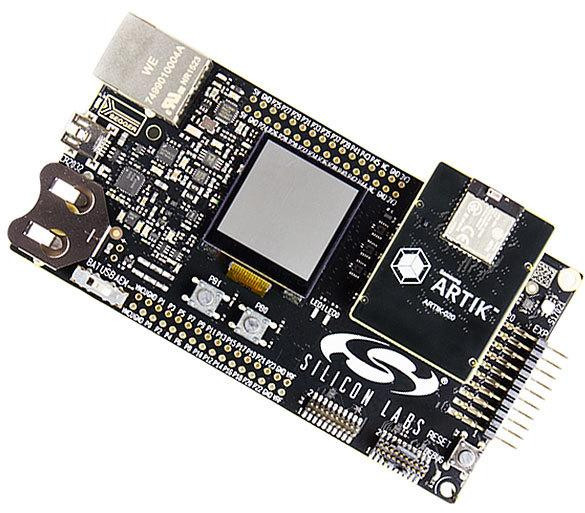A few months ago, we noted SolidRun HoneyComb LX2K became a certified Arm SystemReady ES platform. SystemReady is a certification program by Arm that ensures systems just work with generic operating systems like in the x86 world. When we looked at the details of the program in the article, we noted there were different categories including SystemReady ES for embedded servers and SystemReady IR for IoT Edge applications. The first SystemReady IR platform – NXP i.MX 8 Mini evaluation kit Arm has just announced the first SystemReady IR platform had just been certified. That device is the NXP i.MX 8M Mini EVK, and that means that anyone that uses the i.MX 8M family of devices with the associated Board Support Package (BSP) can build platforms that will pass the same certification process and boot compliant Linux distributions with minimal integration effort. We can see more details about the certifications on Arm developer’s website. NXP i.MX 8M Mini EVK achieved certification with NXP 2021 Q2 pre-release firmware, version LF […]
SolidRun HoneyComb LX2K becomes a certified Arm SystemReady ES platform
SolidRun HoneyComb LX2K is part of our list of the 5 most powerful Arm SBC’s in 2021. The mini-ITX board features an NXP LX2160A 16-core Arm Cortex-A72 processor, supports up to 64GB RAM, offers high-speed networking thanks to up to 4x SFP+ 10GbE cages and a Gigabit Ethernet port, as well as four SATA ports, a PCIe x8 slot, M.2 SSD slot and more. The board is ideal for networking applications and can be also be integrated into an Arm workstation for native application development. But just last month, we noted that while SolidRun talked about SBSA compliance a while ago, the status was unclear. The good news is that HoneyComb LX2K has just now become a certified Arm SystemReady ES (Embedded Server) compliant platform. Arm SystemReady is a set of standards and a compliance certification program that ensures systems just work with generic, off-the-shelf operating systems straight out of […]
Banana Pi BPI-F2S Industrial SBC Launched for $58 with Linux 4.19 based Debian or Fedora OS
Last month we covered Banana Pi BPI-F2S single board computer (SBC) for industrial, IoT, and smart audio application that was powered by the intriguing SunPlus SP7021 “Plus1” processor featuring four Cortex-A7 cores, one ARM9 ARM9 real-time core, and one 8051 I/O controller core, as well as up to 512MB built-in DDR3 RAM. At the time, the board was not available, and we had limited information about software support, except the company would provide a Yocto-based Linux distribution. The good news is that you can now buy Banana Pi BPI-F2S industrial SBC on Aliexpress for $58 and Taobao for 390 RMB, and the company released source code and OS images for the board. Here’s a reminder of Banana Pi BPI-F2S specifications: SoC – Sunplus SP7021 “Plus1” with a quad-core Cortex-A7 processor @ 1.0 GHz, one Arm A926 microprocessor, an 8051 core to handle I/Os, and 128MB or 512MB DDR3 DRAM. Storage […]
ROCK PI N10 RK3399Pro SBC Sells for $99 and up
Rockchip RK3399Pro processor is based on the popular Rockchip RK3399Pro hexa-core Arm Cortex-A72/A53 processor plus an embedded neural processing unit (NPU) delivering up to 3 TOPS for AI acceleration. So far you had to spend over $200 to get either Toybrick RK3399Pro board or 96Boards RK3399Pro development kit to get started with the processor. Some other companies announced their own RK3399Pro SBC such as Pine64 RockPro64-AI, or Khadas Edge board, but those are not available yet. But there’s now a more affordable Rockchip RK3399Pro SBC courtesy of Radxa’s Rock Pi N10 available on Seeed Studio in three variants: $99 model A with 4GB RAM (3GB for CPU/GPU + 1GB for NPU), 16GB eMMC flash $129 model B with 6GB RAM (4GB for CPU/GPU + 2GB for NPU), 32GB eMMC flash $169 model C with 8GB RAM (4GB for CPU/GPU + 4GB for NPU), 64GB eMMC flash Rock Pi N10 specifications: […]
RISC-V Keynote at Embedded Linux Conference 2018 (Video)
The Embedded Linux Conference and OpenIoT Summit 2018 have just started, and the Linux Foundation has already uploaded a few keynote videos to YouTube, including the one by Yunsup Lee, Co-Founder and CTO, SiFive, entitled “Designing the Next Billion Chips: How RISC-V is Revolutionizing Hardware”. Yunsup explains the current problem with chip development, and go through the open source RISC-V solutions offered by Sifive. Currently design a chip has a high upfront (NRE = non-recurring engineering) costs, is time-consuming (1.5 to 2 years at least) and silicon vendors normally target high volume production, but now many applications like IoT or machine learning require custom chips that may not be (yet) manufactured in such high volume. The solution is to adapt some idea from open source software to open source hardware in order to lower the costs, enable fast prototyping, and involve the community of designers and software developers. He took […]
GIGABYTE MA10-ST0 Server Motherboard is Powered by Intel Atom C3958 “Denverton” 16-Core SoC
Last year, we wrote about Intel Atom C3000 series processor for micro-servers with the post also including some details about MA10-ST0 motherboard. GIGABYTE has finally launched the mini-ITX board with an unannounced Atom C3958 16-core Denverton processor. GIGABYTE MA10-ST0 server board specifications: Processor – Intel Atom C3958 16-core processor @ up to 2.0GHz with 16MB L2 cache (31W TDP) System Memory – 4x DDR4 slots for dual channels memory @ 1866/2133/2400 MHz with up to 128GB ECC R-DIMM, up to 64GB for ECC/non-ECC UDIMM Storage 32GB eMMC flash 4x Mini-SAS up to 16 x SATA 6Gb/s ports 2x Mini-SAS ports are shared with PCIe x8 slot Connectivity 2x 10Gb/s SFP+ LAN ports 2x 1Gb/s LAN ports (Intel I210-AT) 1x 10/100/1000 management LAN Video – VGA port up to 1920×1200@60Hz 32bpp; Aspeed AST2400 chipset with 2D Video Graphic Adapter with PCIe bus interface USB – 2x USB 2.0 ports Expansion Slots […]
Fedora 26 Supports Single “Unified” OS Images for Multiple ARM Platforms
The decision to use device tree in Linux occurred several years ago, after Linus Torvalds complained that Linux on ARM was a mess, with the ultimate goal of providing a unified ARM kernel for all hardware. Most machine specific board files in arch/arm/mach-xxx/ are now gone from the Linux kernel, being replaced by device tree files, and in many case you simply need to replace the DTB (Device Tree Binary) file from an operating system to run on different hardware platforms. However, this is not always that easy as U-boot still often differ between boards / devices, so it’s quite frequent to distribute different firmware / OS images per board. Fedora has taken another approach, as the developers are instead distributing a single Fedora 26 OS ARMv7 image, together with an installation script. Images for 64-bit ARM (Aarch64) are a little different since they are designed for SBSA compliant servers, so […]
Samsung Introduces $5 ARTIK 0 and $50 ARTIK 7 Smart IoT Module Families
Samsung unveiled ARTIK 1, 3 and 5 boards for the Internet of Things in 2015, and started to sell them, together with development with WiFi, BLE and Zigbee connectivity earlier this year. The Korean company has now announced two new family with ARTIK 0 modules powered by an ARM Cortex-M MCU and destined to be used in HVAC, lighting, industrial sensors, personal health monitoring and more, as well as ARTIK 7 family powered by an Octa-core Cortex A53 processor, and targeting IoT gateways. ARTIK 0 Family ARTIK 0 family is now comprised for ARTIK 020 with Bluetooth, and ARTIK 030 for applications requiring Thread and/or Zigbee. Beside the different radios, both modules share the same key features: MCU – ARM Cortex-M4 up to 40 MHz with Floating Point Unit, 256KB flash, 32 KB SRAM, advanced hardware cryptographic engine with support for AES-128/-256, ECC, SHA-1, SHA-256, and a Random Number Generator […]


